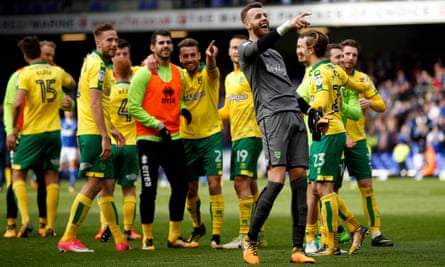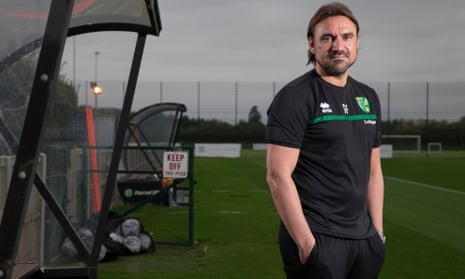When Norwich City visit the Emirates Stadium for Tuesday’s Carabao Cup tie against Arsenal, they will be led by a man who could once have been described as the Arsène Wenger of the German lower leagues. Daniel Farke, the 40-year-old appointed as the Norwich coach in May, rose to prominence by becoming the dominant figure at SV Lippstadt, a fifth-tier club he transformed on and off the pitch. Unlike Wenger, Farke decided to leave after delivering success and a new stadium.
“I never wanted to become a coach,” Farke says. “Working as a head coach always seemed to be a bit short term. You lose five games and you’re out of a job. I always wanted to work on the long term and help structure things. I wanted to be a sporting director. So I began studying economics in university [in Paderborn] while still a player so that I could learn about contracts, taxes and things like that. I was only playing in the third tier so I had time to do that after training.”
Shortly after retiring at 31, the former striker took a coaching course – “but not because I wanted to become a coach, it was to earn some knowledge about what it is like to be a coach because as a sporting director you have to appoint and work with coaches”. Six months after hanging up his boots he was given a chance to fulfil his sporting director ambition at Lippstadt, the club where he had spent most of his playing career. The catch was he would have to combine his duties with the role of head coach for 10 matches until the end of the season. “The problem was we won nine of those matches and drew the other one,” he says. “But I also thought: ‘This coaching is not too bad,’ and the players said: ‘We like working for you as a coach.’ And because it was only the fifth tier it was possible to do both jobs.”
That is what he did for the next six years, leading Lippstadt to the third tier. “In a small club you have to do everything: negotiate with the bus company, do all the contracts, all the press work, all the coaching work. It was really exhausting. There was very little time for other experiences and to see how other coaches work and how people work in different countries. And then I became really focused on a new stadium. I had to sign a contract for three years because all the sponsors said: ‘We will only support if Daniel Farke is sporting director and coach.’ There were offers from other German clubs but Lippstadt was kind of like my own home club and I felt really responsible for people.”
Shortly after the completion of the 4,000-capacity Stadion Am Bruchbaum, Farke stepped down with the intention of taking a year’s sabbatical. But less three months later he got a call from Michael Zorc, the sporting director of Borussia Dortmund, who needed a coach for their under-23s following David Wagner’s departure to Huddersfield Town. Dortmund are the biggest club in Farke’s native region. His grandfather, Franz, played for them in the 1950s. It did not take long to realise this was an opportunity to be seized, especially after he met the head coach of the first team, Thomas Tuchel, whose ideas about football matched his own.

He felt a similar communion with Stuart Webber, the Norwich City sporting director, who got in touch at the end of last season after being impressed by how Farke followed up his success at Lippstadt by guiding Dortmund’s reserves to promotion. Webber, who had attracted Wagner to Huddersfield before moving to Carrow Road, convinced Farke to make a similar move.
“I knew Norwich is a massive club, and in Germany we all know about the famous win over Bayern Munich [in 1993] but I didn’t know each and every player,” he says. “I came over several times and had many discussions with Stuart Webber and also many other people. And I realised I wanted to come here. I have this feeling that the club and the city are open-minded and they want this time of change. They want to implement a new structure and I really felt honoured I should be allowed to be responsible, together with Stuart Webber, for leading this change. You are the club’s first manager from outside Britain or Ireland, you are a non-native speaker and there are high expectations. The supporters are addicted to this club and they want to be back in the Premier League as soon as possible. It’s such a big challenge and that’s the reason I wanted to join. It is the most interesting task I’ve had.”
It did not get off to a smooth start. There was a high turnover of players in the summer – 16 out, 12 in – and a 4-0 defeat at Millwall left the club in the relegation zone after five matches. Now Norwich are in the Championship play-off places and the derby victory against Ipswich Town on Sunday means they travel to Arsenal on a nine-match unbeaten run. Farke has shored up a leaky defence so successfully they recorded five consecutive clean sheets in the league for the first time in Norwich’s history. But Farke says they are still a long way off playing his preferred style, which he describes as similar to that of Tuchel or Pep Guardiola.
“I always want my players to be the protagonists on the pitch. I like us to be in possession. There are some other philosophies that are good, such as working against the ball and creating counteractions. Jürgen Klopp, for example, did that in his first years at Dortmund and Red Bull Leipzig do it now. In that way you work a lot on pressing and when you win the ball it goes immediately in the other direction. That can be successful and really attractive. But I like more to be in possession, more like Guardiola or Tuchel or like Bayern Munich.
“It’s so hard to create chances against a really compact and solid defending opponent that some managers say: ‘Listen, if it’s so difficult, just give them the ball, wait till you win it back and then you counterattack.’ I’m the other way around, although of course counterattacking is necessary. When it’s so difficult to create chances against a solid defence, then the difference between a good team and a really good team is you are able to do it. And that’s my philosophy. We work a lot on controlling the game, the structure of possession and controlling the ball. That is always our most important topic but, to be honest, I want to be good against the ball too and in counterattacks and set pieces, so it’s always a fluid process.
“And it’s important to have a plan B, C, D and E. We always have clear principles but you have to have different plans of how to bring these principles on to the pitch. That’s one reason why our base formation is fluid: sometimes we play 4-1-4-1, sometimes 3-5-2, sometimes 4-2-3-1. I want the players to be really flexible. That means a lot of work for players. It’s up to me to keep it simple.”
He dismisses claims that such an approach is too idealistic for the Championship. “People say the same thing in Germany: the second league is a fighting league, it’s not so much about philosophy, it’s about winning headers and duels and getting the second balls,” he says. “Yes, you have to do all those things. But when everyone does them, there must also be a difference between teams. Our quality on the ball should be the difference. That’s what I try to implement. If you are always hunting and chasing, you get exhausted. The idea is to exhaust the opponents, not yourselves. And I believe in this even more here because you have a higher workload and no winter break.”
Norwich’s incentive to get back to the Premier League is clear: this is the last year they will receive parachute payments following relegation in 2016. But with teams such as Middlesbrough, Wolverhampton Wanderers and Aston Villa spending heavily and Norwich in the midst of a transition, Farke says it is unrealistic to target automatic promotion this season. “But I’m not a coach because I just want to fulfil realistic expectations. Otherwise I would have just worked in economics. Here I work every day to try to do something special.”

Comments (…)
Sign in or create your Guardian account to join the discussion